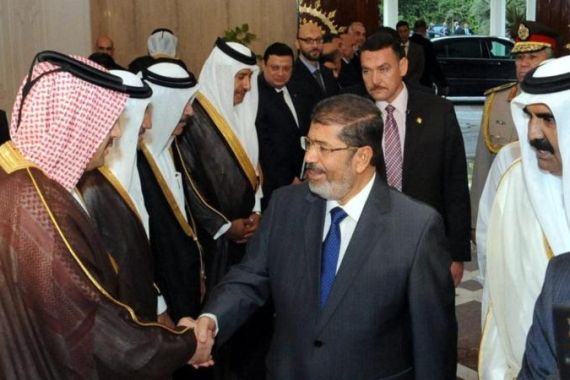Qatar pledges $2bn for Egypt’s central bank
Announcement follows Cairo meeting between President Mohamed Morsi and Qatar’s emir, Sheikh Hamad bin Khalifa Al Thani.

Qatar is to deposit $2bn at the Egyptian Central Bank in an effort to help support an economy battered by a year and a half of political turmoil, an Egyptian presidency statement has said.
The announcement came after meeting in Cairo on Saturday between President Mohamed Morsi and Qatar’s emir, Sheikh Hamad bin Khalifa Al Thani.
Keep reading
list of 4 itemsWhen will EVs become mainstream in the US?
Key takeaways from Xi Jinping’s European tour to France, Serbia and Hungary
Air Vanuatu goes into liquidation, thousands of passengers stranded
Egypt’s foreign reserves began a steep decline last year when a popular uprising against the government of Hosni Mubarak sent the economy into a tailspin and led the central bank to start selling dollars to prop up the country’s pound.
The economy faces a looming balance of payments crisis and high state borrowing costs, with experts saying financial aid is urgently needed to avoid currency devaluation.
The emir of Qatar held talks with Morsi during the first trip to the country by a Gulf leader since Egypt’s new president was sworn in on June 30.
Austerity measures
Morsi’s new cabinet will have to decide whether it should implement new and potentially painful austerity measures to help stabilise government finances and secure foreign financial help.
Political unrest has scared away tourists and foreign investors and prompted government employees to strike for higher wages.
The central bank’s reserves have fallen sharply since the fall of Mubarak, the former president, in February 2011. Reserves are at $14.4bn, against $36bn a year and a half ago.
The cash shortfall raises fears about Egypt’s ability to maintain imports of basic commodities such as wheat and refined fuel, and to honour its international financial commitments.
A mission from the International Monetary Fund (IMF) will arrive in Cairo this month to resume talks with the government over a $3.2bn loan.
Political tensions have been delaying the unlocking of aid as the IMF demanded that any loan gets broad political support. The Egyptian government expects a growth rate of 3.5 to 4 per cent in the 2012 to 2013 fiscal year.
Gulf governments have offered some aid to Cairo, including a $1bn deposit from Saudi Arabia at the central bank earlier this year.